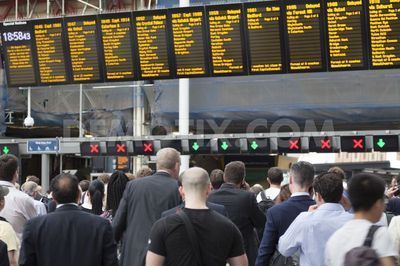English as she isn't spoke, part 2
By ADRIAN TAHOURDIN
Ah, the joys of station announcements. There have been plenty of those at London Bridge recently, a stone’s throw from the TLS’s new offices, as the station undergoes major rebuilding (which will take three years). The punctuality rates of trains (never very good) have fallen through the floor, as the picture above demonstrates (you will need to magnify it, but suffice it to say that the word "Delayed" occurs frequently). This is all happening at the UK’s fourth busiest rail terminal.
A couple of years ago, I posted about the excruciating genteelisms that (mostly pre-recorded) station or train announcements trade in, along the lines of “. . . customers who pay the additional premium to enjoy first class travel”.
Here are a few more:
“Train services are experiencing delays”. Can an inanimate, albeit moving, object “experience” something? Might not “trains are running late” do fine?
There are the ones that just go a bit wrong: “I apologize for any delay to your service [who’s “I” by the way?]. This is due to awaiting a train crew.” Or “This is in reaction to a shortage of available train crew.” “In reaction to”?
I also like: ”We apologize for any inconvenience this cancellation may cause” (my italics). Is it not a given that a late-running train will cause inconvenience?
And then there’s my favourite: “please be advised”, as in “Please be advised that your journey time will be extended. This is due to . . .". Or “Please be advised that this service has been cancelled” and “You are advised the train will be delayed a short while . . .".
Of course the trains themselves are frequently “subject to delays or platform alterations” (which makes me feel sorry for the trains; on the face of it, maybe they are sentient beings after all).
Tenses can be strange: “The 8:59 is being delayed.” Is being? “It has become necessary to cancel the. . .". (In a similar vein, footballers, when interviewed after a match, tend to use the past continuous rather than a more standard tense, as in “I’ve gone in there with my studs up and I’ve caught him. I’ve apologized to the lad . . .".)
Finally, there are the often engaging announcements made by the train drivers or guards/inspectors (better known as “revenue protection officers”). They are usually worth listening to, conveying as they do a sense of mystery: “This is the first train to leave Brighton for London Bridge for some considerable time . . .“.
Or how about this?
“We will endeavour to get you to your stations as quickly and safely as possible”. Reassuring.
Peter Stothard's Blog
- Peter Stothard's profile
- 30 followers




